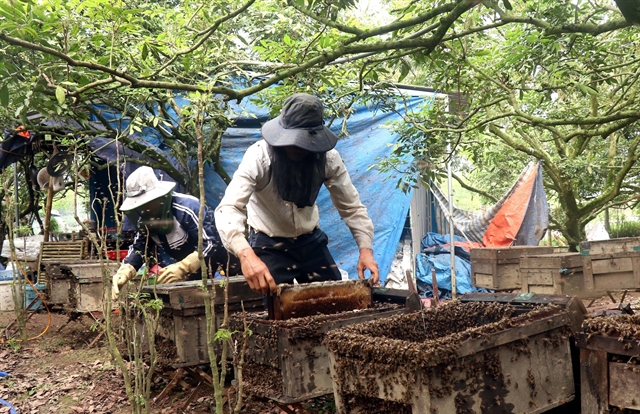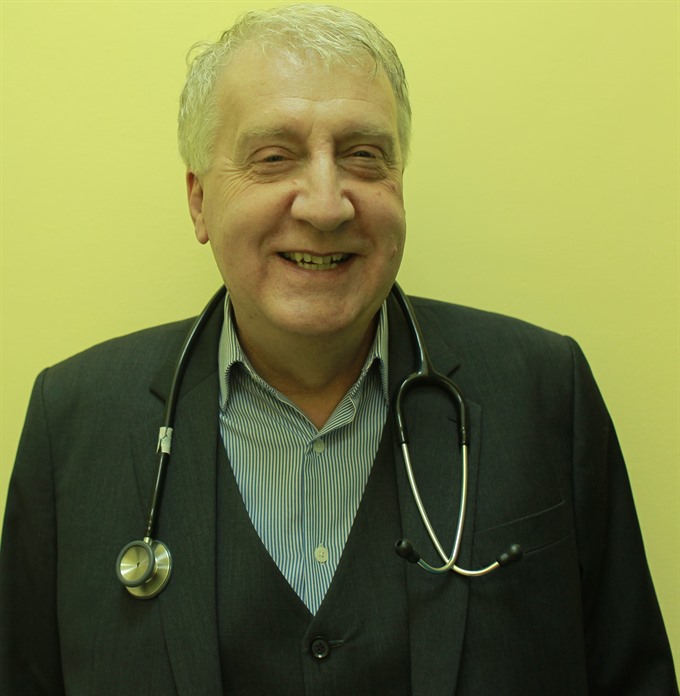 Life & Style
Life & Style

August through November, the so-called “wet months” in Hà Nội, are prime season for mosquito-borne diseases, the number of dengue fever cases in the capital has increased since the beginning of this year.
 |
| Doctor William Brian McNaull. — Photo Courtesy of Family Medical Practice Hanoi |
by Dr Brian McNaull*
August through November, the so-called “wet months” in Hà Nội, are prime season for mosquito-borne diseases, the number of dengue fever cases in the capital has increased since the beginning of this year.
Dengue (DENG-gay) fever is a mosquito-borne disease that occurs in tropical and subtropical areas of the world. Mild dengue fever causes high fever, rash, and muscle and joint pain. A severe form of dengue fever, also called dengue hemorrhagic fever, can cause severe bleeding, a sudden drop in blood pressure (shock) and death.
Millions of cases of dengue infection occur worldwide each year. Dengue fever is most common in Southeast Asia and the western Pacific islands, but the disease has also been showing up more frequently in Latin America and the Caribbean.
Symptoms
Many people, especially children and teens, may experience no symptoms at all. When symptoms do occur, they usually begin 3 to 10 days after the infected mosquito bite. These most commonly include:
You might also experience:
Most people recover within a week or so. In rare cases, however, symptoms worsen and can become life-threatening with bleeding from the nose and mouth, severe abdominal pain and bleeding under the skin, which may look like bruising
Immunity
Dengue fever is caused by any one of four dengue viruses spread by mosquitoes that thrive in and near human lodgings. When a mosquito bites a person infected with a dengue virus, it becomes a carrier and then infects someone else it bites.
After you’ve recovered from dengue fever, you have immunity to the virus that infected you — but not to the other three dengue viruses. The risk of developing dengue hemorrhagic fever increases if you’re infected a second, third or fourth time.
Risk factors
Complications?
In rare cases, dengue fever can damage the lungs, liver or heart. Blood pressure can drop to dangerous levels, causing shock and, in some cases, death.
Diagnosis
Diagnosing dengue fever can be difficult, because its signs and symptoms can be easily confused with those of other diseases — such as malaria, leptospirosis and typhoid fever.
Your doctor will likely ask about your medical and travel history. Certain laboratory tests can detect evidence of the dengue viruses
Treatment
No specific treatment for dengue fever exists. Your doctor may recommend that you drink plenty of fluids to avoid dehydration from vomiting and high fever. Acetaminophen (Tylenol, others) can alleviate pain and reduce fever. Avoid pain relievers that can increase bleeding complications — such as aspirin, ibuprofen (Advil, Motrin, others) and naproxen sodium (Aleve).
If you have severe dengue fever, you may need:
Prevention
A dengue fever vaccine is in development, but isn’t generally available. If you are living or traveling in tropical areas where dengue fever is common, these tips may help reduce your risk of mosquito bites:
- Stay in air-conditioned or well-screened housing: It’s particularly important to keep mosquitoes out at night.
- Reschedule outdoor activities: Avoid being outdoors at dawn, dusk and early evening, when more mosquitoes are out.
- Wear protective clothing: When you go into mosquito-infested areas, wear a long-sleeved shirt, long pants, socks and shoes.
- Use mosquito repellent: Permethrin can be applied to your clothing, shoes, camping gear and bed netting. You can also buy clothing made with permethrin already in it. For your skin, use a repellent containing at least a 10 percent concentration of DEET.
- Reduce mosquito habitat: The mosquitoes that carry the dengue virus typically live in and around houses, breeding in standing water that can collect in such things as used automobile tires. Reduce the breeding habitat to lower mosquito populations. — Family Medical Practice Vietnam
* Dr William Brian McNaull serves as Medical Director at Family Medical Practice Hanoi. He brings extensive experience to the practice.
For more advice on any medical topics, visit Family Medical Practice Hanoi on 298 I Kim Mã, Ba Đình, Tel: (04 or 024 from June 17th) 3843 0748 and hanoi@vietnammedicalpractice.com.
FMP’s downtown HCM City location is at Diamond Plaza, 34 Lê Duẩn, District 1; Other facilities are at: 95 Thảo Điền Street, District 2. Tel: (08) 38227848. E:hcmc@vietnammedicalpractice.com
FMP Danang is located at 96-98 Nguyễn Văn Linh Street, Hải Châu District, Đà Nẵng. Tel: (0236) 3582 699. E: danang@vietnammedicalpractice.com.









